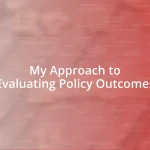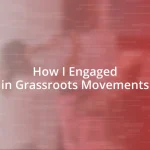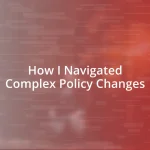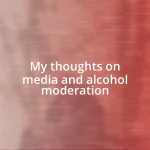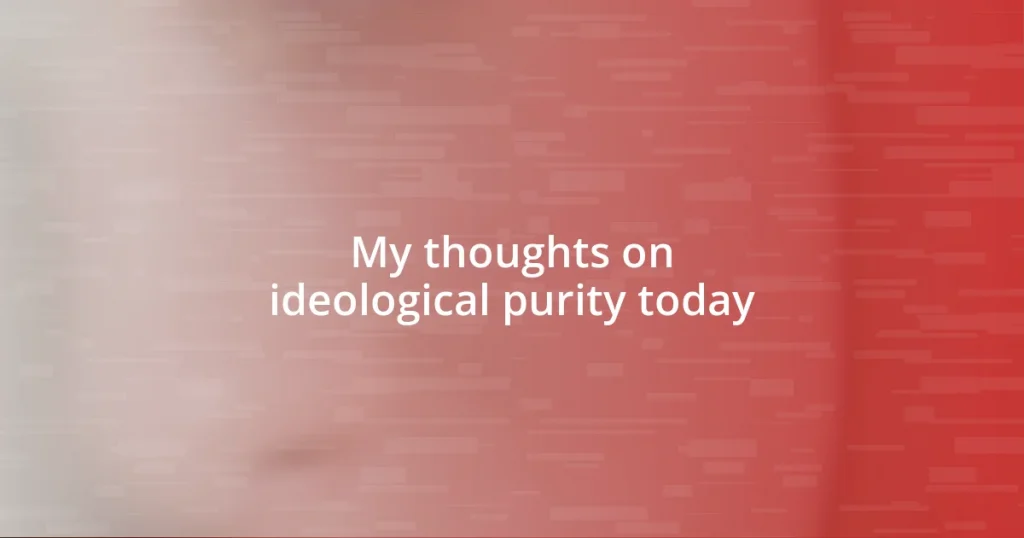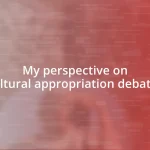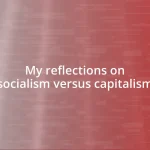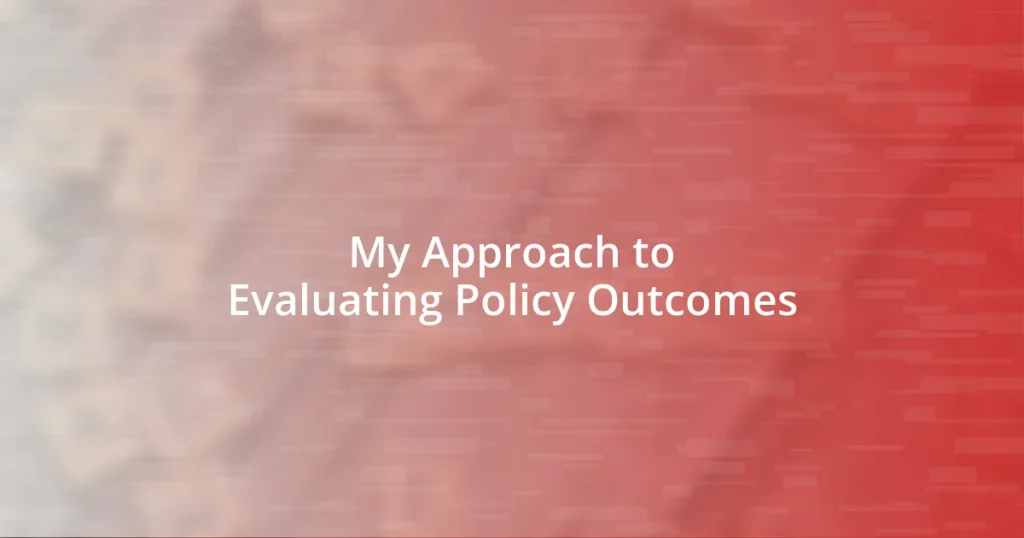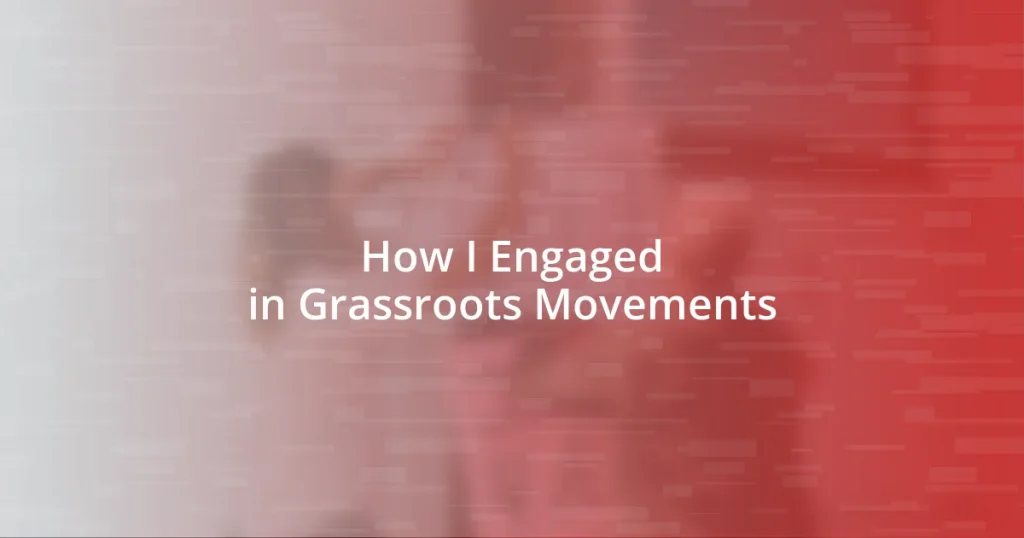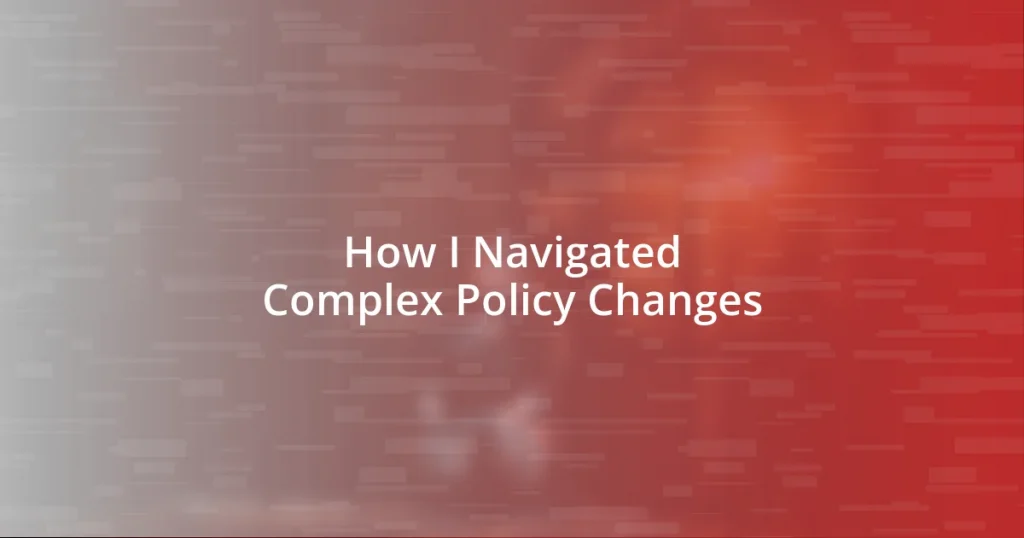Key takeaways:
- Ideological purity can create divides, hindering personal growth and meaningful connections as individuals become entrenched in their beliefs.
- Historical movements, such as the French Revolution and Cultural Revolution, illustrate the extreme consequences of strict ideological adherence, often sidelining individual freedoms for collective zeal.
- Fostering open dialogue through active listening, asking reflective questions, and creating safe spaces encourages understanding and flexibility in beliefs, allowing for constructive discussions.
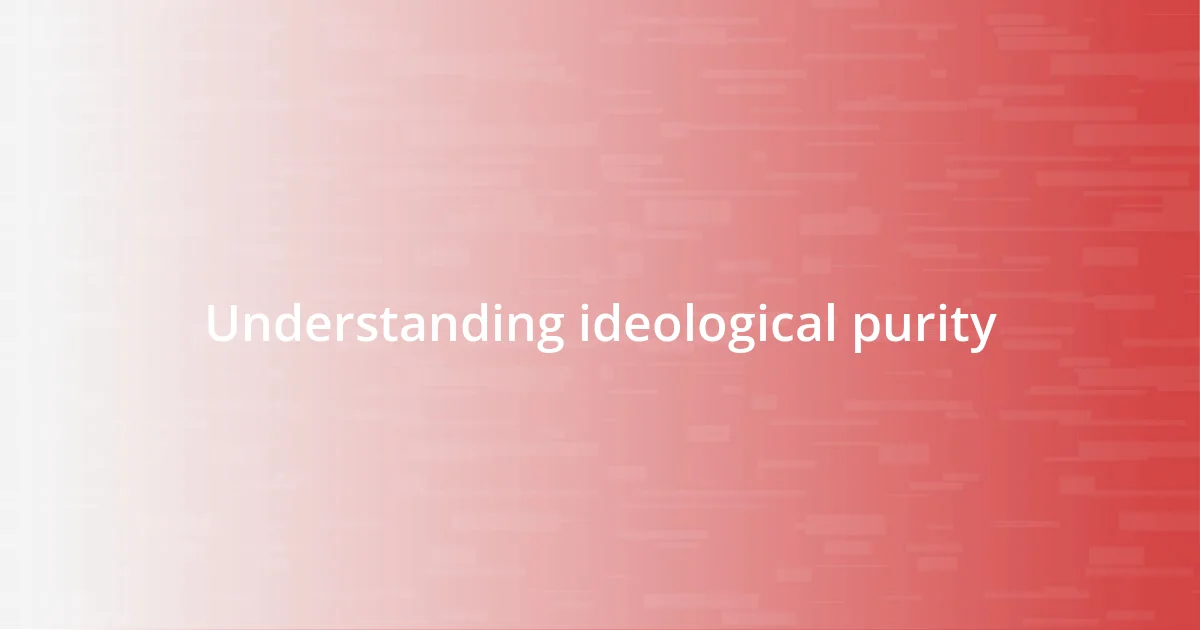
Understanding ideological purity
Ideological purity, at its core, refers to the commitment to a rigid set of beliefs and values, often excluding any viewpoints that deviate from this framework. I remember a conversation with a friend who identified strongly with a particular political ideology. She became frustrated when discussing alternative perspectives, which made me wonder—does holding onto these beliefs tightly actually hinder our ability to grow and understand one another?
It fascinates me how much ideological purity can create divides, not just between groups but within individuals too. There was a time when I found myself torn between two conflicting beliefs. It felt like a tug-of-war in my mind, questioning if I was compromising my values or simply expanding my understanding. This experience led me to appreciate the beauty of nuance—can we really claim to know the truth if we never consider the spectrum of opinions around us?
It’s easy to slip into the comfort of ideological purity, but I’ve learned that such an approach can be limiting. I’ve seen people lose friendships over minor disagreements, raising the question: are we truly standing for our beliefs, or are we allowing our ideologies to dictate our relationships? The emotional toll of this rigidity often overshadows the potential for meaningful connection and growth, prompting us to reevaluate our priorities in discourse and human connection.
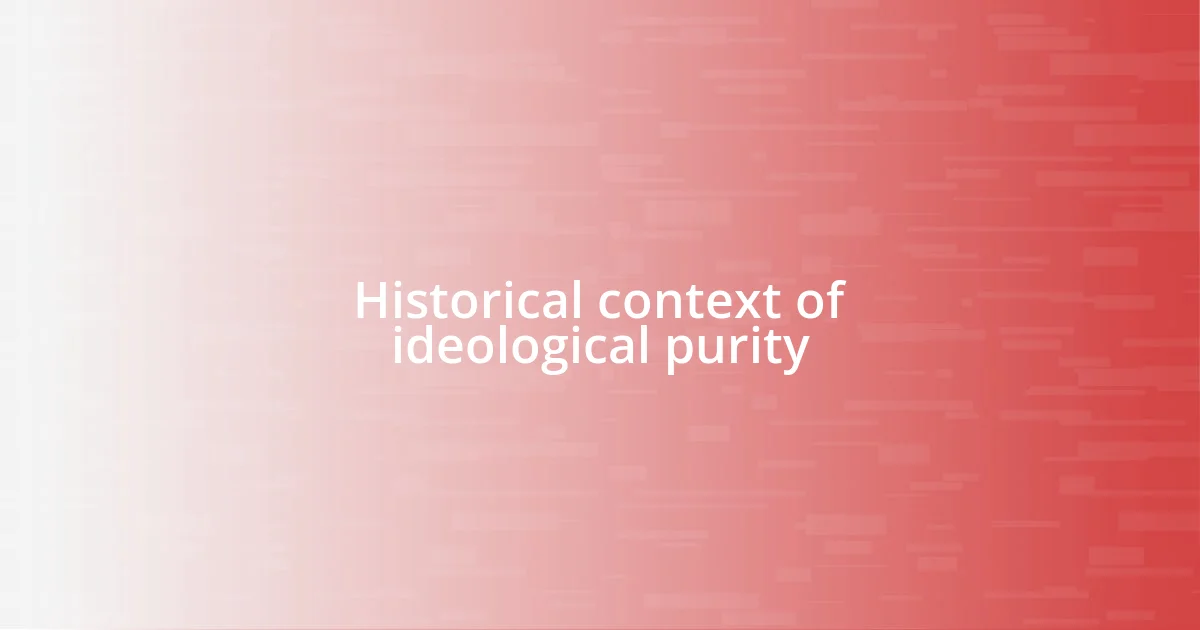
Historical context of ideological purity
Throughout history, ideological purity has often been wielded as a powerful tool for social cohesion and political dominance. I recall studying the fervent movements during the French Revolution; they didn’t just seek change but demanded strict adherence to revolutionary ideals. It’s interesting to note how these fervent beliefs sometimes led to drastic outcomes, like the Reign of Terror, where dissenting voices faced dire consequences, showing just how extreme the quest for purity can be.
- Major historical movements embodying ideological purity include:
- The French Revolution, which enforced radical democratic ideals.
- The Cultural Revolution in China, emphasizing Maoist thought and suppressing dissent.
- The rise of fascism in Europe, where nationalistic purity dictated social and political norms.
During these times, there seems to be a recurring theme where the collective zeal for a specific ideology sidelined individual freedoms. I often think about how in college, we had heated debates on Marxism versus capitalism. While the discussions were passionate, the line between healthy debate and ideological purity sometimes blurred. I remember feeling both exhilaration and apprehension as we passionately defended our beliefs, realizing that enthusiasm could easily morph into dogma if we weren’t careful.
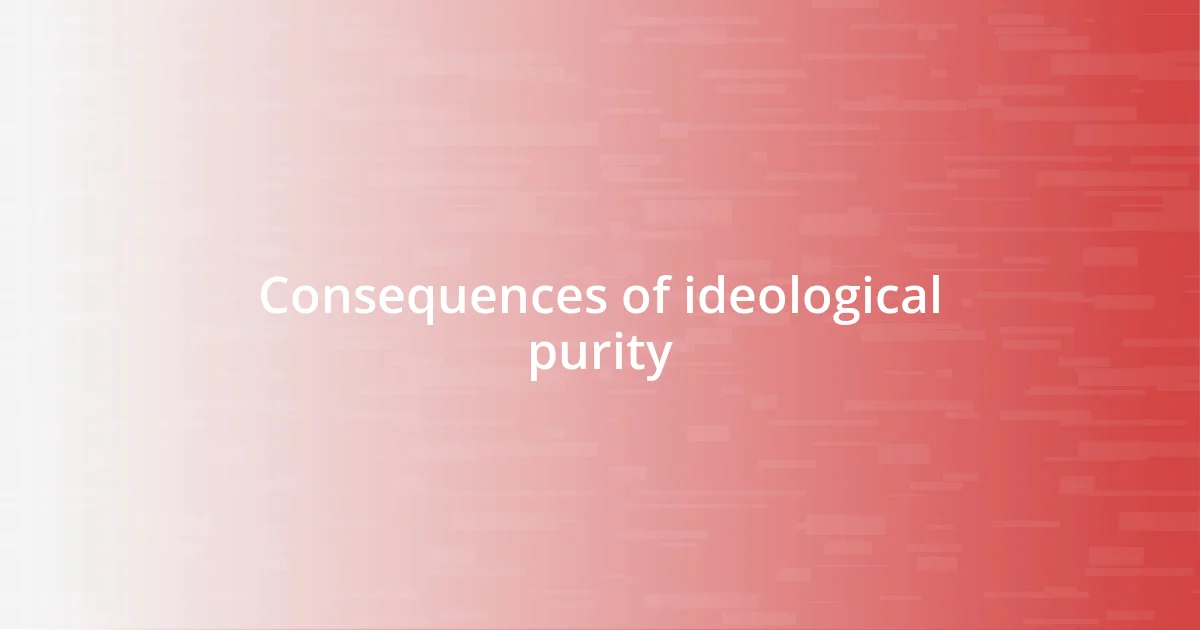
Consequences of ideological purity
The problem with ideological purity is that it often leads to an us-versus-them mentality. I’ve observed this firsthand during community discussions that started with good intentions but quickly devolved into arguments. People became entrenched in their views, dismissing valuable input and reducing the conversation to a battleground. This experience taught me how critical it is to remain open to differing perspectives if we genuinely want to foster understanding.
Moreover, holding onto a rigid ideological framework can stifle creativity and innovation. I once participated in a project where team members clung to a singular approach. Our brainstorming sessions felt more like rehearsals for a debate rather than the creative exchange I envisioned. In hindsight, I realize that embracing diverse ideas not only enriches our discussions but can lead to groundbreaking solutions and advancements.
Finally, the emotional consequences of strict ideological adherence can be profound. I remember feeling disheartened when friends cut ties over political disagreements. Those experiences forced me to reflect on the essence of connection. Why lose meaningful relationships over differences rather than celebrating the rich tapestry of perspectives? It makes me wonder: could we not gain more through compromise and empathy?
| Consequences | Description |
|---|---|
| Division | Creating separations between individuals and groups, leading to conflict. |
| Stagnation | Limiting creativity and innovation by rejecting alternative ideas. |
| Emotional Toll | Resulting in strained relationships and feelings of isolation. |
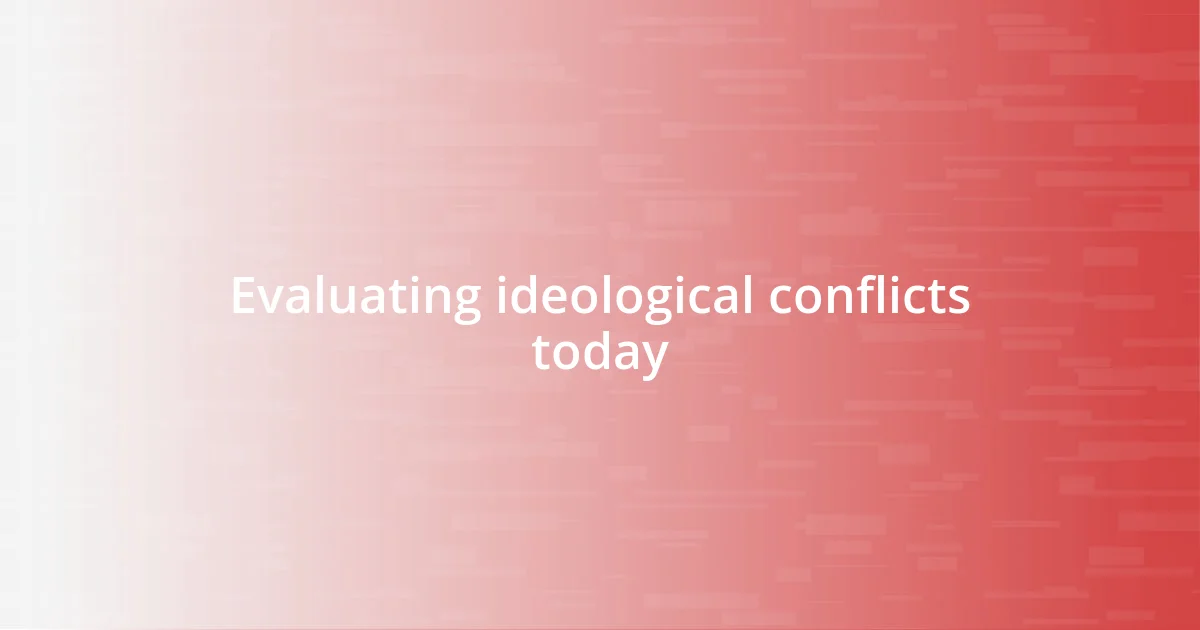
Evaluating ideological conflicts today
Navigating the landscape of ideological conflicts today feels like walking a tightrope. I was recently at a gathering where friends who once shared similar values found themselves on opposite sides of a seemingly small political issue. It struck me how quickly dialogue shifted from constructive discussion to defensiveness. Why does it seem that the moment we hold onto our beliefs too tightly, we lose the ability to simply listen?
In my own experience, I often question how much our ideological commitments shape our identities. I recall a time when I was very vocal about my views on social justice, but I hesitated to listen to alternative perspectives. This lack of openness not only stifled my understanding but also created friction in my relationships. I began to wonder: could the willingness to engage with differing viewpoints actually deepen our convictions rather than dilute them?
It’s fascinating to think about how these ideological battles manifest in everyday life. I frequently see discussions on social media devolve into name-calling and outright hostility over topics where, just a few years ago, civil conversation was more common. This raises a crucial question for me: how do we bring empathy back into our debates? I believe that reevaluating our approach to ideological conflicts can pave the way for more productive, humane discussions, ultimately helping us to align our values with understanding instead of division.
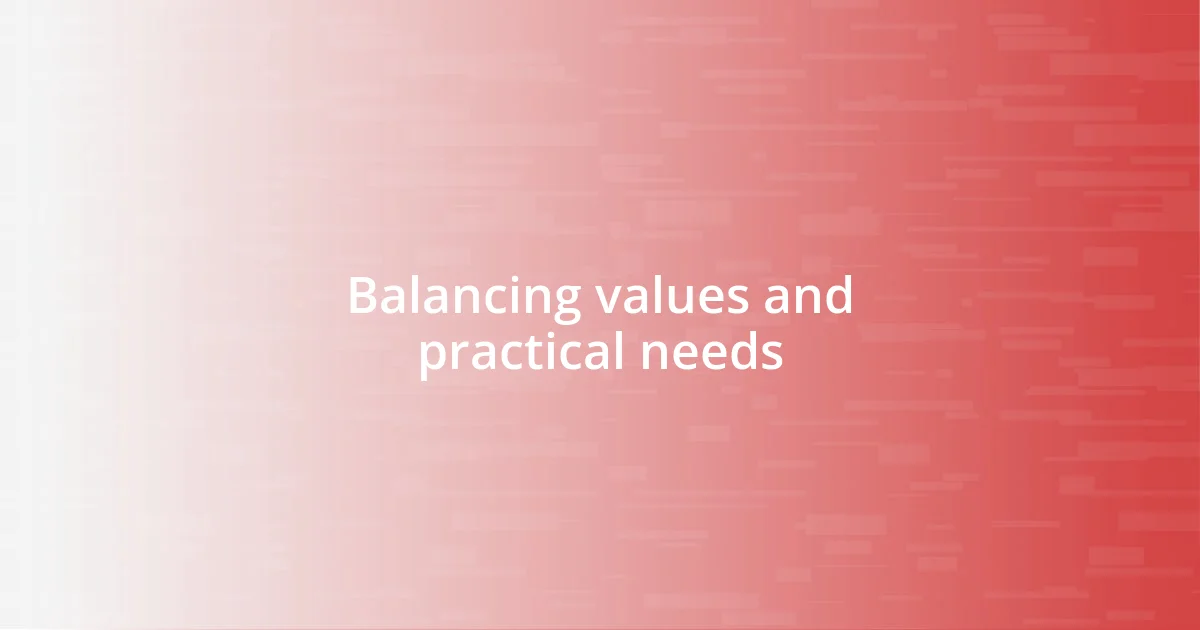
Balancing values and practical needs
It’s easy to become so focused on our values that we lose sight of the practical needs around us. I remember a time when I volunteered for a community initiative that aimed to promote sustainable practices. While everyone was passionate about eco-friendliness, the group struggled to implement solutions that met the immediate needs of the community. This experience highlighted for me how necessary it is to strike a balance between holding onto our ideals and addressing the reality on the ground.
In another instance, I found myself caught in a debate about educational reform. I had strong beliefs about inclusivity in schools, but as discussions progressed, it became clear that some recommendations would create roadblocks for teachers already facing challenges. I asked myself, how do we prioritize our values without jeopardizing practical progress? It struck me that flexibility is essential; sometimes, realigning our ideals can open doors for more impactful solutions.
Ultimately, the interplay of values and practical needs reminds me of walking a tightrope. One misstep, and we risk falling into the abyss of rigidity or apathy. I often think about how these moments of reflection can guide us to find common ground. Isn’t it refreshing to imagine a scenario where our values serve as a foundation for collaborative progress, rather than a barrier that keeps us apart? In these moments, I find not only clarity but also a renewed motivation to work towards a future that honors both our ideals and practical realities.
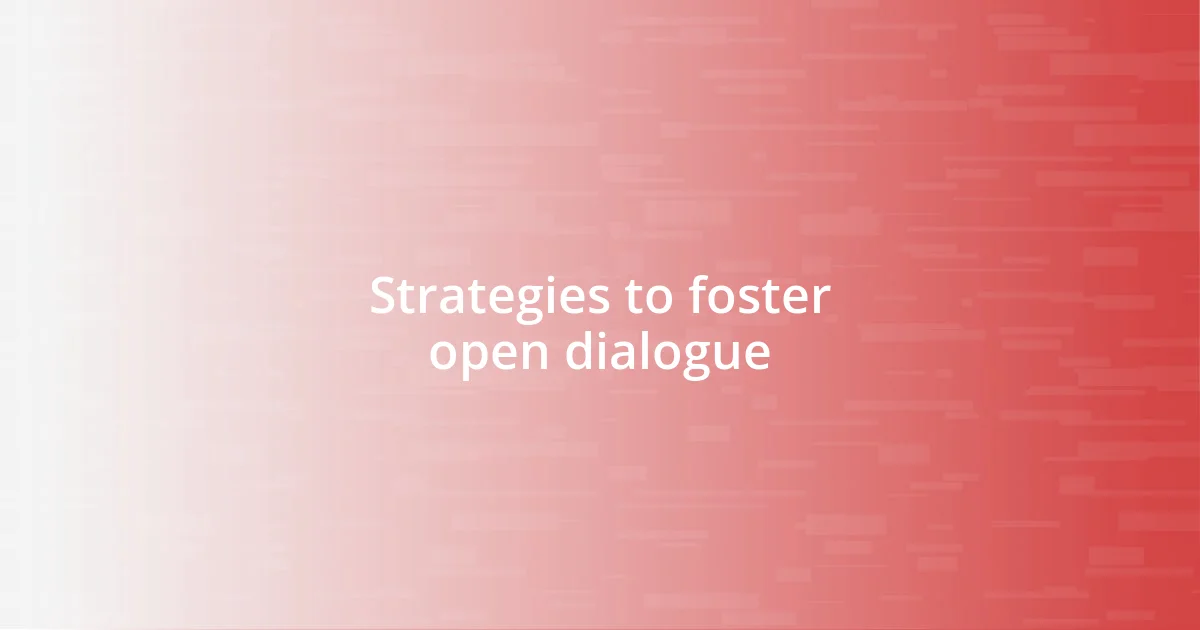
Strategies to foster open dialogue
To foster open dialogue, actively listening is crucial. I remember a heated discussion at a book club where opinions clashed around a controversial topic. Instead of trying to convince each other, we took turns sharing our thoughts without interruption. This simple shift in approach created a respectful atmosphere that encouraged deeper exploration of differing perspectives. It raised a question for me: what if we learned to listen first instead of jumping straight into our own viewpoints?
Another strategy involves asking open-ended questions that invite reflection and discussion. I’ve seen how powerful a single question can be—like when I asked a friend, “What experiences shaped your views on this?” Suddenly, the focus shifted from arguing to storytelling, allowing for a richer understanding of one another’s backgrounds. This shift not only deepened my connection with friends but also opened the door to challenging conversations that might otherwise have remained closed.
Finally, creating safe spaces for dialogue is imperative. During a community workshop I attended, we implemented “ground rules” that emphasized respect and confidentiality. This environment made participants feel secure in sharing their thoughts without fear of judgment. Isn’t it amazing how a supportive setting can transform a possibly confrontational discussion into a constructive dialogue? I believe that when we establish these safe havens, we’re not just promoting open dialogue; we’re also inviting growth and connection among those who may initially see the world through different lenses.
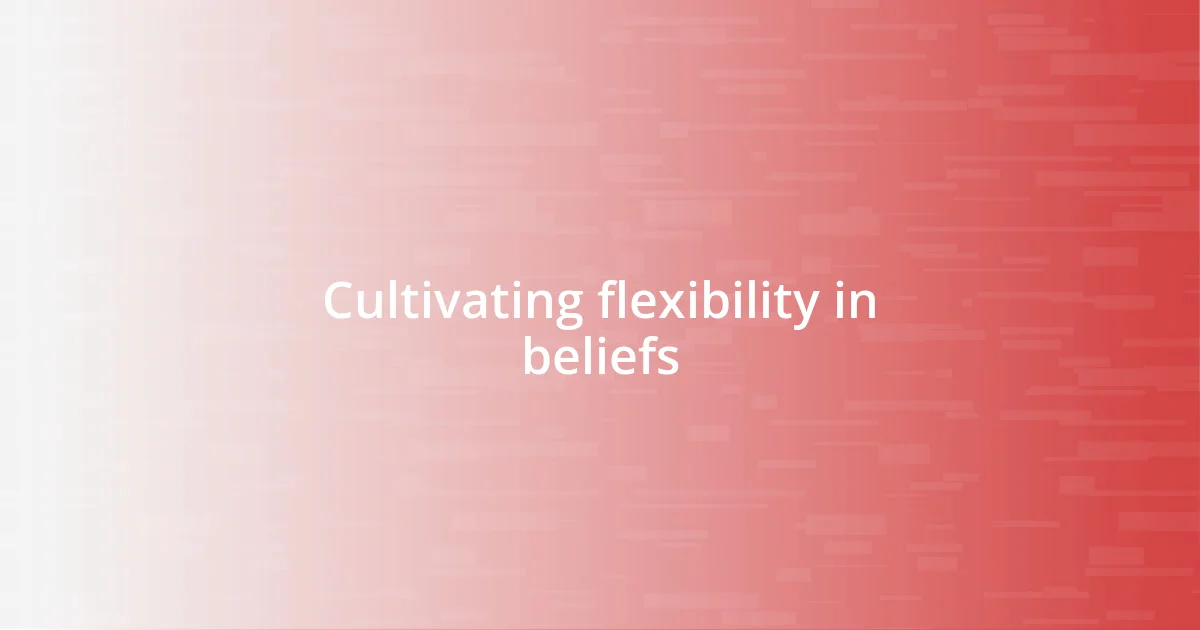
Cultivating flexibility in beliefs
Cultivating flexibility in our beliefs can be challenging, but it’s essential for healthy discourse. I recall an instance during a family gathering when my cousin presented a viewpoint that sharply contrasted with mine. Initially, I felt defensive, but as I listened, I realized that her perspective was shaped by experiences I hadn’t considered. This moment taught me that embracing flexibility doesn’t mean abandoning my beliefs; it allows for deeper understanding and growth. What if we approached discussions with a mindset of curiosity?
Moreover, I often think about how rigidity can blind us to new solutions. Recently, while attending a workshop on conflict resolution, I was struck by a participant who changed his stance after hearing different viewpoints. His willingness to adapt was refreshing and highlighted the power of being open. Isn’t it fascinating how our beliefs evolve when faced with diverse experiences? Embracing flexibility can lead to unexpected connections and opportunities.
Ultimately, cultivating this flexibility is an ongoing journey. I’m reminded of my early days in a dynamic workplace where differing ideas clashed regularly. Initially, I felt overwhelmed, but over time, I learned to appreciate the richness that comes from such diversity. By remaining open and flexible, I can navigate complex discussions without feeling threatened. This experience makes me wonder: what doors might we open if we allowed our beliefs to coexist, rather than compete with one another? It’s a liberating thought, isn’t it?
